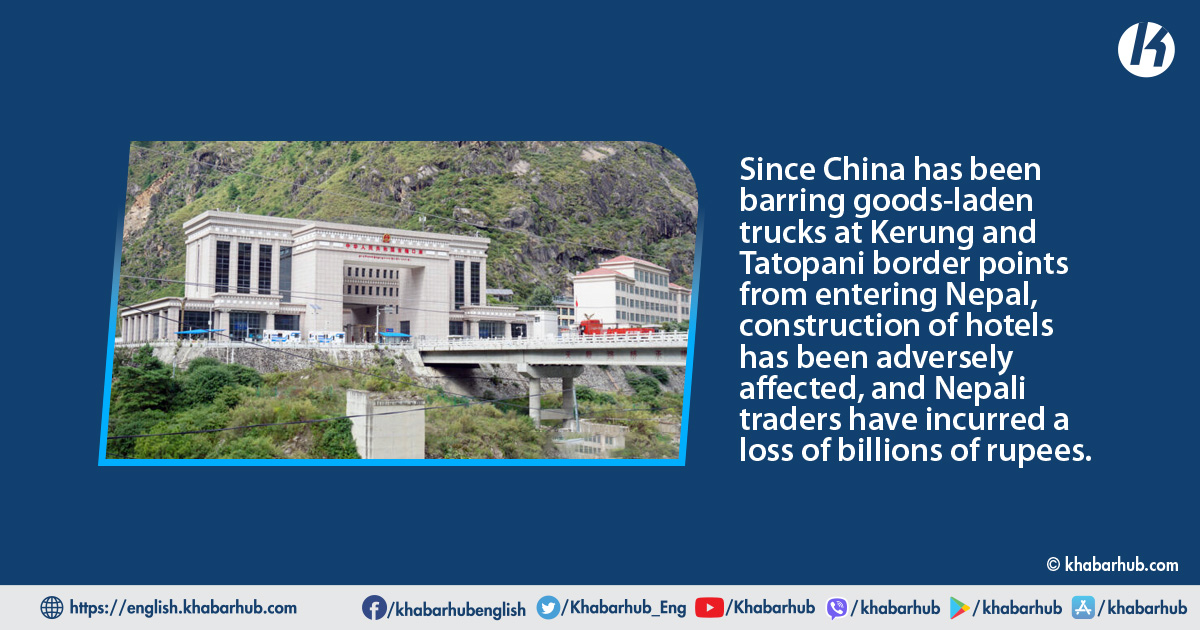KATHMANDU: Construction works of hotels in Nepal have been delayed after China has shown reluctance to supply adequate furniture and furniture items.
The work has come to a standstill due to the non-availability of necessary furniture items for two hotels of Siddhartha Hospitality Group and Barahi Group, which are currently under construction and have a target to bring into operation from April 14.
It is said that most of the hotels in Nepal are bringing furniture and other items from China due to “cheap price”.
Currently, Hotel Sheraton, Hotel Barahi, Bhangeri Resort, Dusit Thani and Hyatt Palace are under construction.
Likewise, Hotel Sheraton, which is also under construction in Thamel, owned by the former president of the Non-Resident Nepali Association, will take another year and a half to come into operation.
The construction cost of the hotel is estimated at Rs 10 billion and the cost will increase by another Rs 2 billion due to China’s undeclared blockade.
Lately, hotels have been in trouble as China has not given priority to selling furniture-related interior design items to Nepal.

Nepali businessmen are in trouble after China has given priority to Europe, America, and other countries to export its furniture.
Many Nepali traders have been importing goods from China due to the overall cost as it is expensive to import furniture from other countries, including Europe.
China is also one of the biggest exporters of wooden furniture. According to data from the General Administration of Customs of China, the export value of Chinese furniture and parts in 2018 was USD 53.69 billion.
Some of the major countries to which China exports furniture include the European Union, the United States, Hong Kong, Japan, and Vietnam.
According to the Statistical Communiqué on the 2020 National Economic and Social Development, the value of exports of furniture and furniture parts was USD 63.50 billion in 2020, up 12.2% on the year before.
During the Covid-19 pandemic, almost all industries have been impacted to some extent or the other. However, the custom‑made furniture market of China is expected to grow to USD 52.54 billion by 2024.
According to information released by the China National Furniture Association (CNFA), there are 50 furniture manufacturing clusters in China, covering the six regions of the Pearl River Delta (PRD), Yangtze River Delta (YRD), Bohai Rim, north‑eastern China, central China, and western China.
Traders have started bringing goods from China through India as China has not cooperated for the easy import of goods. The goods imported from China have been stopped at Kerung port for about a year and the traders have stopped bringing goods through Kerung after incurring the loss of billions of rupees.
The PRD is China’s largest furniture manufacturing base with the highest furniture industry concentration, the highest production output, and the strongest integrated support capability.
Next comes Fujian, Zhejiang, Jiangsu, Shandong, and Shanghai, which have an edge in product quality and operations management.
In the YRD region, led by Shanghai, the furniture industry is developing rapidly, with the highest average growth rate in the country. The northern and northeastern regions, with Beijing at the center, have a sound furniture industry base and rich wood resources.
The five-star hotel being constructed by the Siddhartha Business Group of Hospitality in Bhairawahawa has been delayed due to the non-availability of furniture and interior decoration items. The construction period will be extended and the cost will also increase due to the non-availability of goods on time.
Similarly, the Barahi group is constructing a five-star hotel with a shopping complex in Thamel, Kathmandu.
The date of operation has been projected to be delayed in the arrival of essential items including furniture.
According to Yogendra Bikram Thapa, Corporate Sales & Marketing Director of Barahi group said that the construction work of the hotel is still pending.
The hotel was also being prepared to operate from Nepali New Year 2079. However, he said that due to the shortage of goods, the operation period will be extended and the cost will also increase. The hotel has completed 80 percent of the construction work. He said that they have been importing the required stuff from India.

At present, traders have been keeping containers at Chinese ports for three months by paying the waiting fees. As the Chinese market is cheaper than others, many hoteliers have chosen China.
Similarly, Sajan Shakya, General Secretary of the Hotel Association of Nepal (HAN), said that the organization is ready to cooperate if they are facing the problems of goods being bought from China with doing lobbying with the government.
Due to the pandemic, the hotel sector has been adversely hit and the delay in construction of the hotels has increased the investment, he added.
Moreover, the hotels are compelled to operate with 5% occupancy during the pandemic.
The investment in the hotel is done once and output will come back to normalcy. He, therefore, suggested not to worry and took calm on this matter hoping it will ease gradually.
Traders have started bringing goods from China through India as China has not cooperated for the easy import of goods.
The goods imported from China have been stopped at Kerung port for about a year and the traders have stopped bringing goods through Kerung after incurring the loss of billions of rupees.
It is said that it was difficult to import goods through Kerung and Tatopani border crossings due to Chinese officials.
“It takes around 40/42 days to bring goods from China by ship via India. Goods arrive in Nepal within 20/22 days when brought from Tatopani and Kerung without any hindrance. Traders are forced to import goods through India,” political analyst and former Ambassador to Denmark, Vijay Kant Karna said.
He labels it as a type of economic blockade by China.
According to the trade protocol, a country must provide the route to the ocean for a land-locked country.
However, China is violating the protocol too, he said adding that only two-three trucks enter Nepal of late.
Similarly, people from the bordering districts of Nepal were allowed to enter up to 20 kilometers in China to buy some goods without any hassles.
“However, China has currently obstructing easy access to Nepali people, which shows China’s extremist attitude,” he added.
Businessmen and locals have been complaining that the two checkpoints (Tatopani-Khasa and Rasuwagadhi-Kerung) with China have not been operating smoothly for a long time.
The Kerung and Tatopani checkpoints, which were closed after the start of the Covid-19, have not been fully functional.
Even though as many as 250 trucks used to enter Nepal with goods on a daily basis, currently, only 20 vehicles enter Nepal daily through these checkpoints.
According to the Rasuwagadhi Customs Office, only nine trucks are entering Nepal each day from the Rasuwagadhi checkpoint and 11 trucks from the Tatopani checkpoint.
According to the Nepal Trans Himalaya Border Commerce Association, hundreds of trucks loaded with goods have been stranded in China as the Chinese side has not allowed them to enter Nepal.
According to local hotelier Tenzing Tamang, Nepali businessmen have faced problems, and truck owners have also suffered due to China.
They say that the container operators have not been able to pay even the bank interests.
“Up to 200 loaded trucks vehicles used to come from China each day. Currently, not more than 5 trucks enter Nepal,” transporter Arjun Poudel told Khabarhub.
As many as one thousand to 15 hundred trucks are waiting for their turn, and it will take one year for a truck for its turn if China continued to obstruct the border, he adds.
Similarly, local hotel and import-export businessman Cheten Gallpo Lama says, “Tourists have stopped coming, the tourism activities are also minimal. China has been reluctant to open the border.”









Comment